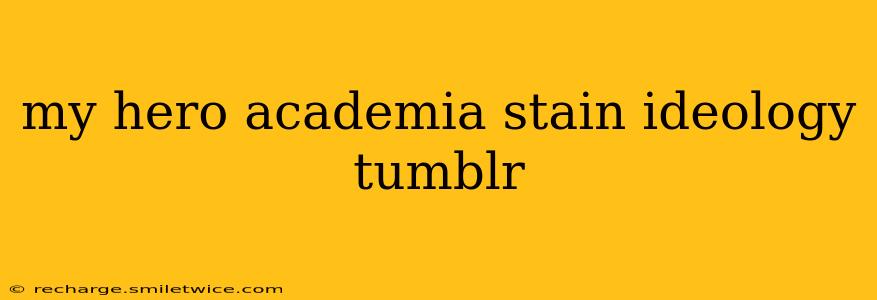My Hero Academia's Stain, the "Hero Killer," isn't just a villain; he's a complex character whose ideology has sparked passionate discussions, particularly within the Tumblr community. His actions, though undeniably violent, are rooted in a philosophy that resonates with some, while repelling others. This exploration delves into the intricacies of Stain's beliefs, the reasons behind their popularity (and criticism) on Tumblr, and the broader implications of his character within the My Hero Academia universe.
What is Stain's Ideology?
At its core, Stain's ideology is a twisted form of social justice. He believes that true heroes act selflessly, motivated purely by a desire to help others without seeking fame or recognition. He despises "fake" heroes – those who prioritize personal gain, popularity, or financial rewards over genuine altruism. He sees the current hero society as corrupt, filled with individuals who exploit their powers for self-serving purposes, betraying the very essence of heroism. His "hero killer" actions are presented as a purging of this corruption, a necessary evil to cleanse the system and restore its true meaning.
Why Does Stain's Ideology Resonate on Tumblr?
Tumblr, known for its vibrant communities centered around social justice and critical analysis, provides a fertile ground for dissecting Stain's complex character. His ideology, though extreme, taps into several key themes that resonate with Tumblr users:
- Critique of Capitalism and Power Structures: Stain's rejection of fame-seeking heroes can be interpreted as a critique of the capitalist system, where profit often overshadows ethical considerations. This resonates with Tumblr's strong anti-capitalist sentiments.
- Deconstruction of Heroism: Stain forces viewers to question what constitutes a "true" hero. His actions challenge the simplistic, idealized image of heroism often presented in media. This appeals to Tumblr's intellectual curiosity and inclination toward critical thinking.
- Moral Ambiguity: Stain isn't a straightforward villain. He possesses a strong moral code, albeit a severely warped one. This moral ambiguity makes him a fascinating character to analyze and debate, a common pastime on Tumblr.
- Aesthetic Appeal: Let's be honest, Stain's design is striking. His dark, brooding aesthetic and powerful fighting style contribute to his popularity, further fueling discussions about his character and ideology.
What are the Criticisms of Stain's Ideology?
Despite his popularity, Stain's ideology is far from universally accepted. Many criticize his methods as excessively violent and ultimately counterproductive. His actions lead to chaos and harm, undermining the very system he aims to reform. The ends, in this case, do not justify the means. Crucially, he doesn't offer a constructive alternative; he only destroys.
Is Stain a "Good" Villain?
The question of whether Stain is a "good" villain is a matter of ongoing debate. He isn't simply motivated by power or greed; his actions stem from a deeply ingrained belief system, even if that belief system is fundamentally flawed. This moral complexity is what makes him such a compelling and memorable character.
How Does Stain's Ideology Impact the My Hero Academia Narrative?
Stain serves as a critical catalyst within the My Hero Academia narrative. He forces both heroes and villains to confront the fundamental questions surrounding heroism, justice, and morality. His actions significantly impact the development of several key characters, pushing them to re-evaluate their own values and motivations.
What are the different interpretations of Stain’s ideology?
Several interpretations of Stain's ideology exist within the My Hero Academia fanbase. Some view him as a misguided idealist, others as a ruthless terrorist. The ambiguity of his motives allows for a wide range of interpretations, leading to rich discussions and diverse perspectives.
How does Stain’s ideology relate to other characters in My Hero Academia?
Stain's ideology serves as a foil to other characters within the My Hero Academia universe, particularly those who embody different aspects of heroism. His actions highlight the spectrum of heroism, from selfless dedication to self-serving ambition.
In conclusion, Stain's ideology is a complex and fascinating aspect of My Hero Academia, sparking considerable debate and analysis, particularly within the Tumblr community. His actions, though violent, force viewers to grapple with challenging questions about heroism, justice, and the nature of societal power structures. This ongoing discussion is a testament to the enduring power and complexity of Stain's character.
